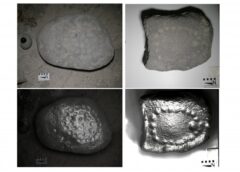Category: The Earth
-
Today is International Polar Bear Day
International Polar Bear Day on February 27 raises awareness on the issues facing polar bears and the ways in which we can reduce our carbon … Today is International Polar Bear Day
-
Scientists discover what was on the menu of the first dinosaurs

The earliest dinosaurs included carnivorous, omnivorous and herbivorous species, according to a team of University of Bristol palaeobiologists.
-
Can Shifting Social Norms Help Mitigate Climate Change?

Newswise — Climate change is the result of many human activities, from carbon emissions to deforestation, and it will take multiple and varied interventions to mitigate it, including legislation, regulation, and market-based solutions implemented at local, national, and global levels. Demand-side factors, such as changes in social norms, can also help by creating political pressure…
-
URI Prof. Isaac Ginis’ Team Is Making Dramatic Improvements in Storm Damage Prediction

“I don’t predict a hurricane season. If a hurricane makes landfall near where you live, that is an active season for you,” says URI Professor of Oceanography Isaac Ginis. Yet predicting the severity of a hurricane can mean the difference between life and death, which is why Ginis makes it his business to predict the…
-
Stone spheres could be from Ancient Greek board game

Archaeologists from the University of Bristol have suggested that mysterious stone spheres found at various ancient settlements across the Aegean and Mediterranean could be playing pieces from one of the earliest ever board games.
-
Observations confirm model predictions of sea-level change from Greenland melt

Rising sea levels from melting glaciers and ice sheets pose an increasing threat to coastal communities worldwide.
-
Ancient Maya cities were dangerously contaminated with mercury

The cities of the ancient Maya in Mesoamerica never fail to impress. But beneath the soil surface, an unexpected danger lurks there: mercury pollution.
-
World Vision halfway toward goal of reaching 50 million people with clean water by 2030

Accomplishment announced at the Concordia Annual Summit 25 million people have been reached with clean water access NEW YORK /PRNewswire/ — World Vision is celebrating a major milestone in its efforts to help end the global water crisis. In 2015, at the time the United Nations’ Sustainable Development Goals were established, World Vision committed to reaching…
-
Methodology For Assessment Of Natural Hazard Vulnerability In US Using Remote Sensing
INTRODUCTION Coastal zone is defined as “the coastal waters (including the lands therein and thereunder) and the adjacent shorelands (including the waters therein and thereunder), strongly influenced by each other and in proximity to the shorelines of the several coastal states, and includes islands, transitional and intertidal areas, salt marshes, wetlands, and beaches.” Coastal locations…
-
How COVID-19 Could Help People Relate to Sea Level Rise

Newswise — The COVID-19 pandemic offered a unique opportunity for climate change experts to relate sea level rise to the general public. In her recent paper “Translated Emission Pathways (TEPs): Long-Term Simulations of COVID-19 CO2 Emissions and Thermosteric Sea Level Rise Projections,” published in “Earth’s Future,” Texas Tech University‘s Ting Lin did exactly that. Working with undergraduate McNair…
